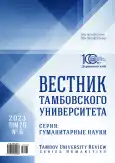Digitalization in the practical training of students of technical universities
- Authors: Tushakova Z.R.1, Chizhikova E.S.1
-
Affiliations:
- Industrial University of Tyumen
- Issue: Vol 28, No 6 (2023)
- Pages: 1376-1386
- Section: PEDAGOGY OF HIGHER EDUCATION
- URL: https://bakhtiniada.ru/1810-0201/article/view/297876
- DOI: https://doi.org/10.20310/1810-0201-2023-28-6-1376-1386
- ID: 297876
Cite item
Full Text
Abstract
Importance. One of the key tasks of the production practice is the experience of transferring knowledge to independently solve new tasks. Modeling of production processes in virtual laboratories, VR training sessions, blockchain can be considered as technologies aimed at development the ability to data transfer, analyze, and systematize. Digitalization of practical training is able to solve the problems of non-standard thinking development, the need to strengthen the responsibility of students, the specialist qualification dependence on the digital technologies possession degree. The possibilities of digital technologies, intellectual information and educational systems in the focus of practical training of students and the development of thinking formed the purpose of the research.Materials and Methods. The review of information sources is carried out, the own experience of practical training organization is systematized. The survey method investigated the attitude of students to online interaction, the attitude of enterprises to the admission of trainees to production facilities. A model of the procedure for evaluating and storing practice results is proposed.Results and Discussion. Artificial intelligence and process automation shift the emphasis of education from algorithmized activities (reading material, drawing up a text plan, selecting key ideas, etc.) to the development of specific non-standard skills – the ability to find a non-stereotypical optimal solution, conduct expertise, apply knowledge in unusual conditions. At the same time, the reduction in the volume of subject material allows us to pay more attention to the development of non-routine actions, autonomy in the workplace, and the development of a proactive attitude to the profession. The virtual model of the technological process allows to see in detail any element of the complex, while the VR operator perceives the object and forms a response. The analysis of the spatial position and state of the object, the transfer of existing theoretical knowledge into a specific production situation, the formation of an objects holistic perception develop both thinking and practical skills. Evaluation of students practical training results with the use of blockchain increases the efficiency of the process, makes the data storage system reliable.Conclusion. Modernization of vocational education through the introduction of adaptive and practice-oriented educational programs, learning and evaluation algorithms based on artificial intelligence solutions will ensure effective digital training.
About the authors
Z. R. Tushakova
Industrial University of Tyumen
Email: tushakovazr@tyuiu.ru
ORCID iD: 0000-0001-5083-508X
PhD (Education), Associate Professor of Electric Power Engineering Department
38 Volodarskogo St., Tyumen, 625000, Russian FederationE. S. Chizhikova
Industrial University of Tyumen
Author for correspondence.
Email: chizhikovaes@tyuiu.ru
ORCID iD: 0000-0002-9212-4144
PhD (Education), Associate Professor of Electric Power Engineering Department
38 Volodarskogo St., Tyumen, 625000, Russian FederationReferences
- ТUvarov A.Yu., Frumin I.D. (eds.). (2019). Trudnosti i perspektivy tsifrovoi transformatsii obrazovaniya [Prob-lems and Prospects of Digital Transformation of Education]. Moscow, National Research University Higher School of Economics Publ., 344 p. https://doi.org/10.17323/978-5-7598-1990-5, https://elib-rary.ru/anygho
- Minin S. (2018). Chuzhie oshibki: kak izbezhat’ provala tsifrovoi transformatsii biznesa. June 19. (In Russ.) Available at: https://www.forbes.ru/tehnologii/363239-chuzhie-oshibki-kak-izbezhat-provala-cifrovoy-transformacii-biznesa (accessed: 20.06.2023).
- Uvarov A.Yu. (2014). Ob opisanii kompetentsii XXI v. [On the description of competences of the 21st century]. Obrazovatel’naya politika = Educational Policy, no. 4 (66), pp. 13-30. (In Russ.) https://elib-rary.ru/tmhveb
- Prutskaya Yu.A. (2022). Professional digital competences of staff for integration into modern digital space. Ka-dry dlya tsifrovoi ekonomiki: novye vektory obucheniya vzroslykh [Personnel for the Digital Economy: New Vectors of Adult Training]. Moscow, Ru-Science Publ., pp. 55-59. (In Russ.) https://elibrary.ru/oxpbjh
- Bugrova O.S. (2022). The development of digital technologies and the role of mastering digital competencies. Ekonomika i predprinimatel’stvo = Journal of Economy and Entrepreneurship, no. 5 (142), pp. 56-60. (In Russ.) https://doi.org/10.34925/EIP.2022.142.5.008, https://elibrary.ru/gzvpfe
- Berezina T.N. (2008). Intellekt i kreativnost’ [Intelligence and creativity]. Edip [Oedipus], no. 3, pp. 92-101. (In Russ.)
- Sorochinskii P.V. (2017). Development of some parameters of human thinking by means of virtual reality. Psik-hologiya kognitivnykh protsessov [Psychology of Cognitive Processes], no. 6, pp. 76-84. (In Russ.) https://elibrary.ru/zoqlax
- Bogoyavlenskaya D.B. (2002). Psikhologiya tvorcheskikh sposobnostei [The Psychology of Creative Abilities]. Moscow, Akademiya Publ., 320 p. (In Russ.)
- Menchinskaya N.A. (1989). Problemy ucheniya i umstvennogo razvitiya shkol’nika [Problems of Teaching and Mental Development of a Schoolchild]. Moscow, Pedagogika, 218 p. (In Russ.)
- Tushakova Z.R., Egorova G.I. (2016). Kreativnye karty po khimii dlya bakalavrov khimicheskikh napravlenii [Creative Cards in Chemistry for Undergraduate Chemistry Majors]. Tyumen, Industrial University of Tyumen Publ., 91 p. (In Russ.) https://elibrary.ru/zewrnd
- Kryazheva E.V., Vinogradskaya M.Yu. (2017). Teoreticheskie podkhody k razvitiyu tvorcheskogo tekhni-cheskogo myshleniya studentov vuza [Theoretical approaches to the development of creative technical thinking of university students]. Uspekhi sovremennoi nauki i obrazovaniya [Successes of Modern Science and Education], no. 10, pp. 97-101. (In Russ.) https://elibrary.ru/zxpudx
- Khokhlova M.V., Lukashov S.V. (2020). Current problems and directions of the university's activities in the organization of industrial practice. In: Kozub L.V. (executive ed.). Sbornik materialov 2 Mezhdunarodnoi nauchno-prakticheskoi konferentsii «Problemy i perspektivy tekhnologicheskogo obrazovaniya v Rossii i za rubezhom» [Proceedings of the 2nd International Scientific-Practical Conference “Problems and Prospects of Technological Education in Russia and Abroad”]. Ishim, P.P. Ershov Ishim Pedagogical Institute (Branch) of Tyumen State University Publ., pp. 69-72. (In Russ.) https://elibrary.ru/opmzrr
- Tolstobokov O.N. (2020). Sovremennye metody i tekhnologii distantsionnogo obucheniya [Modern Methods and Technologies of Distance Learning]. Moscow, World of Science Publ., 72 p. (In Russ.) https://elib-rary.ru/peaoyg
- Ivushkina T.A. (2021). Involving students in online learning. 13th International Conference on Education and New Learning Technologies “Edulearn21”. Valencia, IATED Academy Publ., pp. 11322-11326. https://elibrary.ru/srjrau
- Gadzaova L.P., Goverdovskaya E.V., Alisultanova E.D., Moiseenko N.A. (2021). Organized online learning of students in universities and schools: didactics and methodology. Propositos Y Representaciones, vol. 9, no. S3, pp. e1181. https://doi.org/10.20511/pyr2021.v9nSPE3.1181, https://elibrary.ru/nsjejf
Supplementary files









